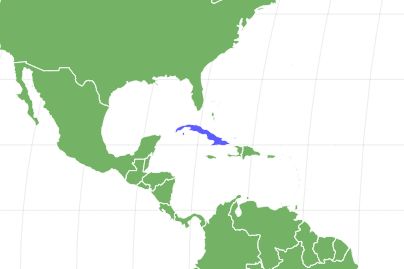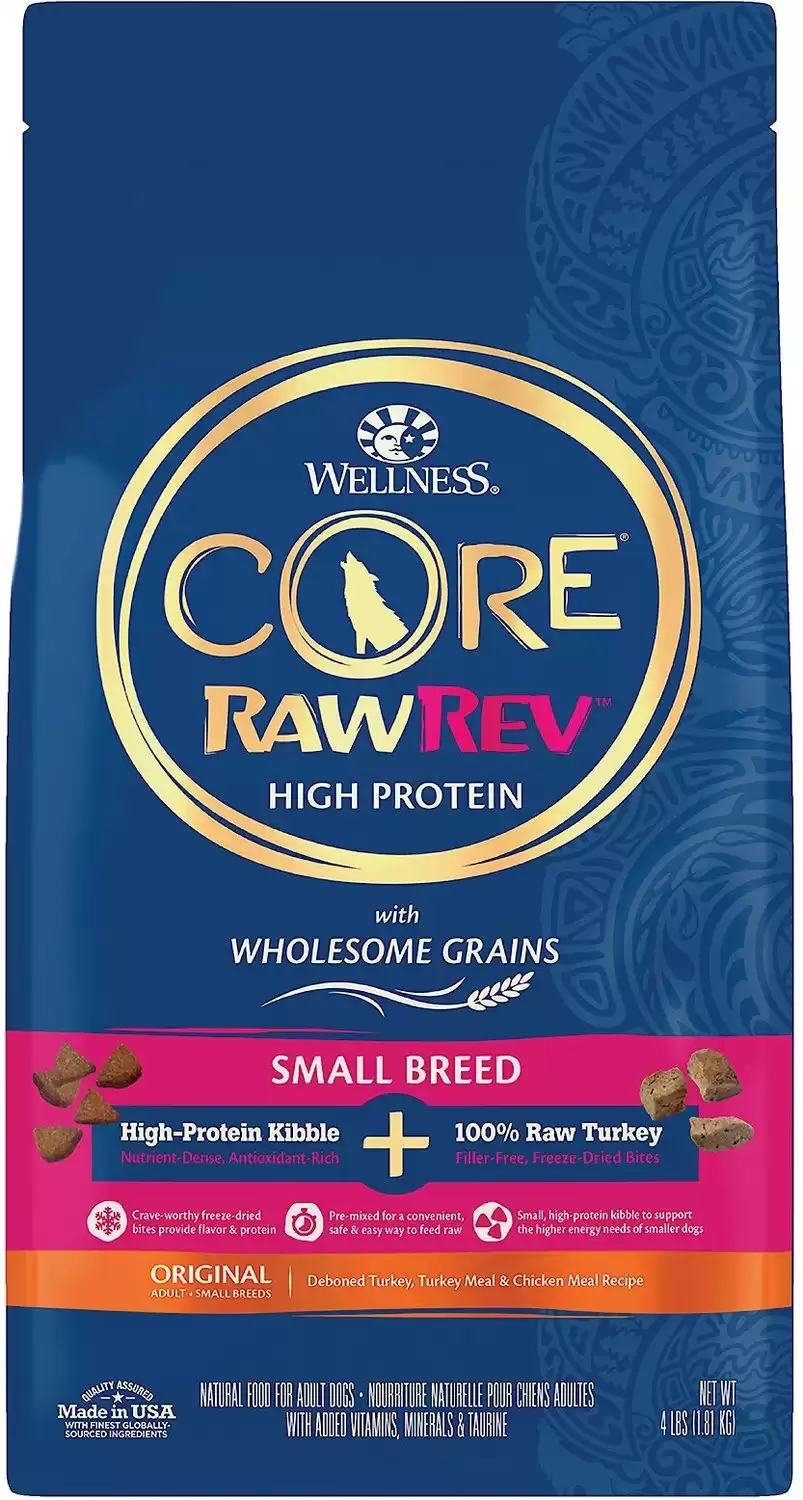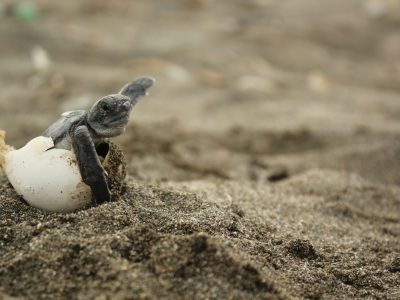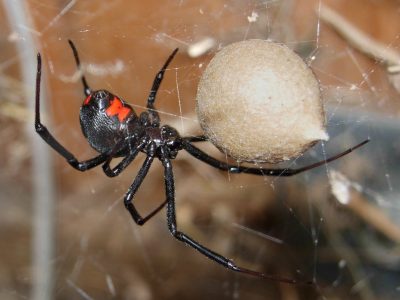Havanese
Canis lupus
Havanese dogs are known to be overly attached to their owner families, often bonding with young children and older adults alike
Advertisement
Havanese Scientific Classification
- Kingdom
- Animalia
- Phylum
- Chordata
- Class
- Mammalia
- Order
- Carnivora
- Family
- Canidae
- Genus
- Canis
- Scientific Name
- Canis lupus
Read our Complete Guide to Classification of Animals.
Havanese Conservation Status
Havanese Facts
- Fun Fact
- Havanese dogs are known to be overly attached to their owner families, often bonding with young children and older adults alike
- Diet
- Omnivore
- Common Name
- Havanese
Havanese as a Pet:
- General Health
- Energy Level
- Shedability
- Trainability
- Intelligence
- Tendency to Chew
- Size
- Family and kid friendliness
- Yappiness / Barking
- Silent
- Hypoallergenic
- Yes
- Separation Anxiety
- High
- Preferred Temperature
- Average climate
- Exercise Needs
- Low
- Friendly With Other Dogs
- High
- Pure bred cost to own
- $800 to $1,200
- Dog group
- Toy
- Male weight
- 7-13 lbs
- Female weight
- 7-13 lbs
This post may contain affiliate links to our partners like Chewy, Amazon, and others. Purchasing through these helps us further the A-Z Animals mission to educate about the world's species.
View all of the Havanese images!
The Havanese dogs originated in Cuba in the 1500s. With their small and sturdy build, they are fairly affectionate and playful as a breed.
They are often welcomed into families for their soft fur, intelligence, and desire to please their loving owners.
See all of our expert product reviews.
The lack of shedding and clever mind of the Havanese dog has earned it a place as a common therapy dog in hospitals, bringing joy to patients that need their spirits lifted. Their mental focus and agile bodies also make it easy to teach tricks, though they are sometimes bred with other dogs for mixed-bred toy dogs.
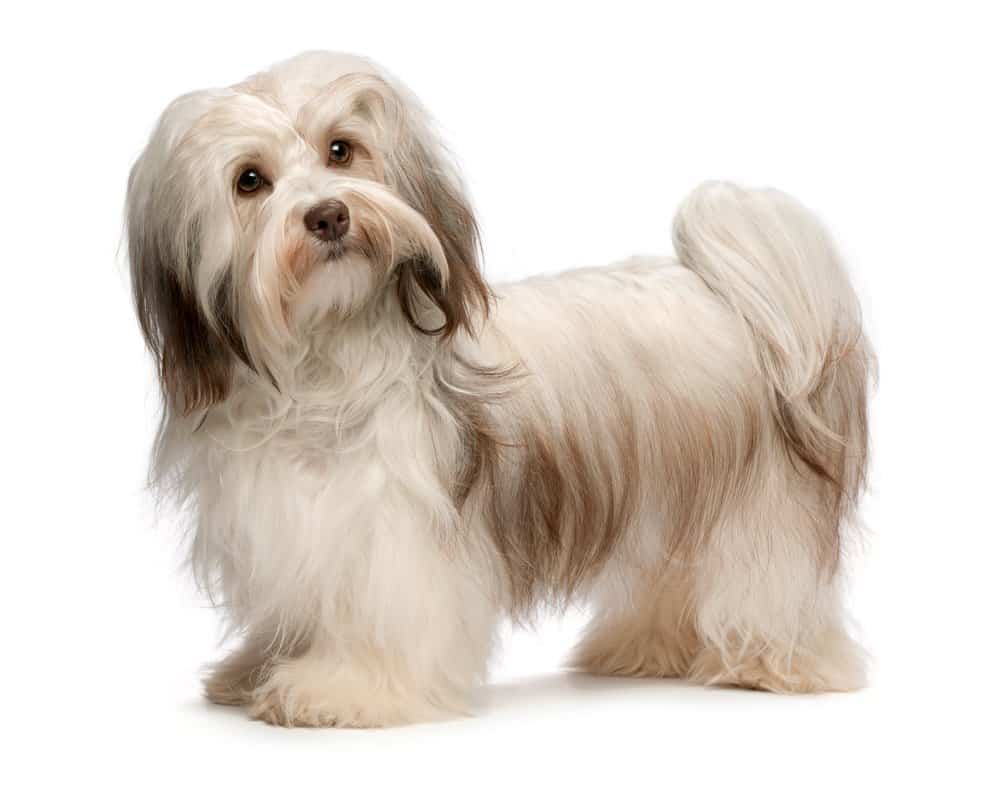
Havanese are great as therapy dogs due to their sharp mind.
©Dorottya Mathe/Shutterstock.com
Havanese dogs are known to be overly attached to their owner families, often bonding with young children and older adults alike. These dogs are highly trainable, and it is not usually difficult to train them, thanks to their acute intelligence.
History of the Breed
The national dog of Cuba, the Havanese was developed from a now-extinct dog called the Blanquito de la Habana. Both the Havanese and the Blanquito come from Bichon-type dogs called the Tenerife, also extinct, which came to Cuba in the 1500s with Spanish farmers and noblemen.
Health and Entertainment for your Havanese
See all of our expert product reviews.
By the 18th century, Europeans vacationing in Cuba discovered the Havanese and they became a trendy dog in Europe. Famous owners were Charles Dickens and Queen Victoria.
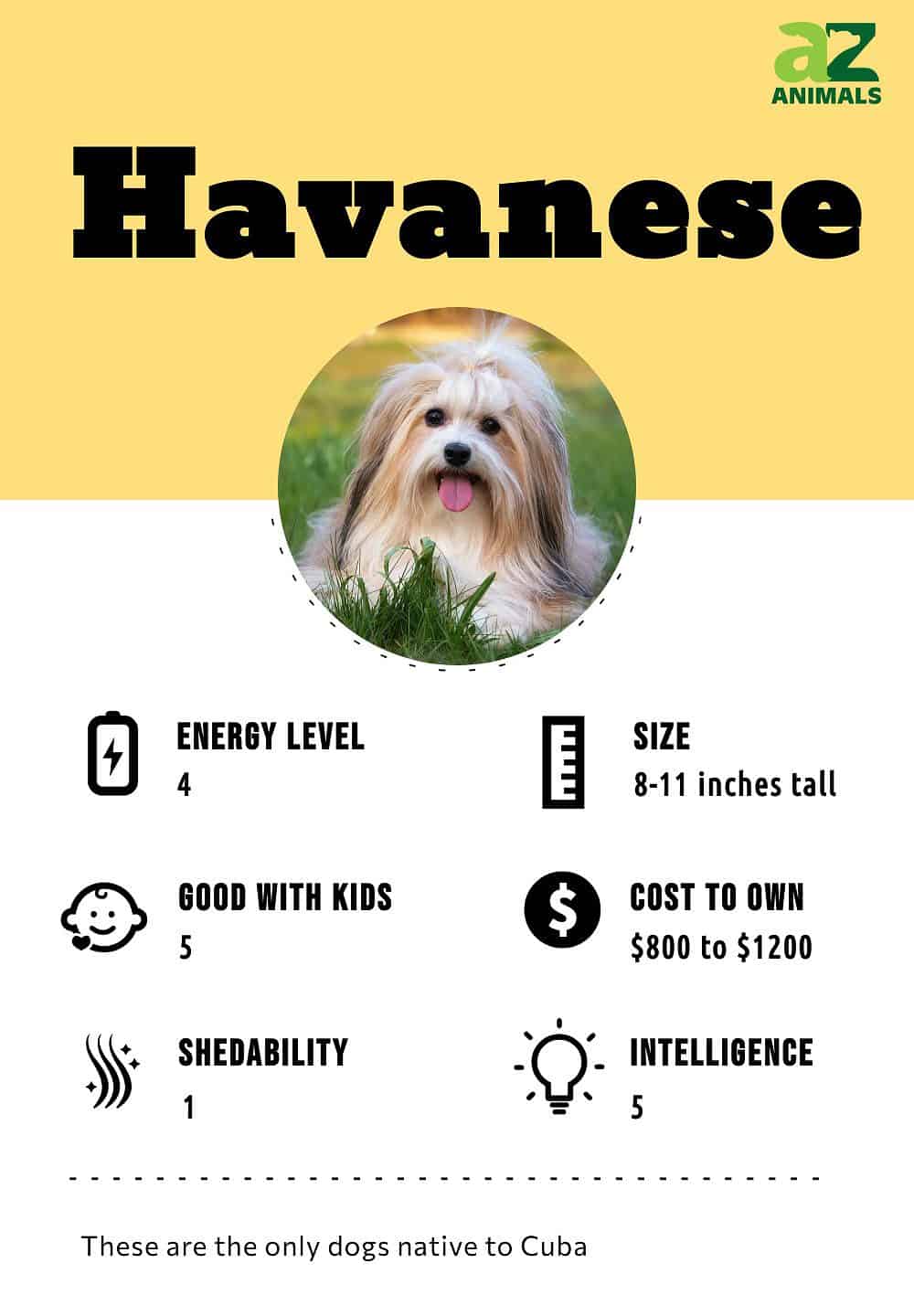
3 Pros and Cons of Owning a Havanese
Before you pick any pet, you would want and need to pay special attention to the pros and cons, so here are a few pros and cons of owning Havanese dogs.
| Pros! | Cons! |
|---|---|
| Social: Havanese dogs are very social and love being around people, making them fun to be around and play with | Barking issues: Havanese dogs love to bark, making them incredibly noisy when they want to get attention from their owners. |
| Easy to train: If you are not someone who would want to spend a lot of time training their pet, Havanese dogs would solve your problem. They are amazingly easy to train, responding well to their owner. | Anxiety issues: Havanese dogs are known to be very anxious, causing them to become panicked when separated for too long from their owner. If you’re away from home for work or other activities often, the Havanese dog would much rather come along. |
| Less exercise required: You would not have to take the Havanese dogs out for playtime quite often as they can very well work with a little amount of exercise. | Timid and shy: Some Havanese dogs can be timid as well as shy so if you are looking for a rough and tough dog to be your pet, you could look for something else. |
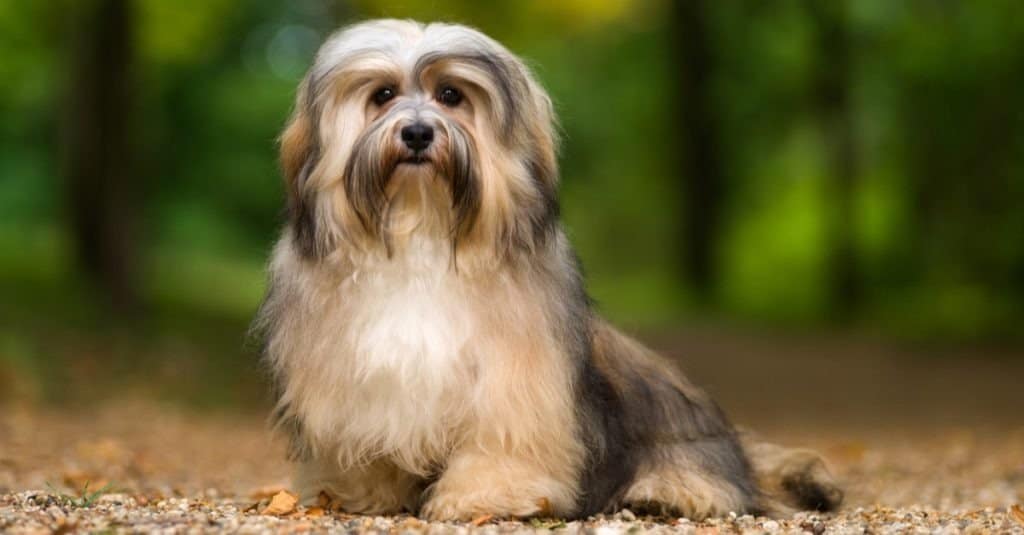
©Dorottya Mathe/Shutterstock.com
Size and Weight
There is little to no difference between the size and weight of a male and a female Havanese. Both of them weigh around 7 to 13 pounds and are 8 to 11 inches in size. However, when the Havanese is mixed with other toy dogs (like the poodle), they may reach up to 15 inches long.
| Height (Male) | 8-11 inches tall |
| Height (Female) | 8-11 inches tall |
| Weight (male) | 7-13 lbs., fully grown |
| Weight (female) | 7-13 lbs., fully grown |
Common Health Issues
Thanks to their healthy breeding, Havanese dogs live long lives with few health concerns. However, there are still a few conditions that you want to have regular veterinary care to prevent and treat. Primarily, the concerns include deafness, eye disorders, and heart problems, which a vet will screen for. However, there are a few conditions that are specific to their genetics and size.
Havanese dogs have a genetic predisposition to chondrodysplasia. Also known as achondroplasia, this condition essentially causes the bones to not reach their full adult size. Often, these dogs have fairly short legs, which are passed down to them by their parents.
Legg-Calve-Perthes Disease is also hereditary, also impacting the poodle, chihuahua, Pomeranian, and other toy or terrier breeds. It impacts the hip in younger dogs, due to the death of the bone. Most dogs with this problem will limp on the leg that it affects.
Another issue that may occur is patellar luxation. This occurs when the kneecap becomes dislocated. Often, when one kneecap is pushed out of place, others will become dislocated as well.
Overall, the health issues that Havanese dogs might suffer from include:
- Deafness
- Eye disorders
- Heart issues
- Chondrodysplasia
- Legg-Calve-Perthes disease
- Patellar luxation
Temperament
If you are looking for a happy and affectionate dog, this pup fills the void. Havanese dogs are known to be very affectionate as well as happy-go-lucky. They love their owner, becoming extremely attached to owner families. Since they prefer to be around their family, they do not make good kennel dogs.
Havanese dogs are clever and intelligent, improving how easy they are to train to be housebroken and prepared for dog shows. They have no trouble in quickly picking up commands, keeping their mind engaged and stimulated.
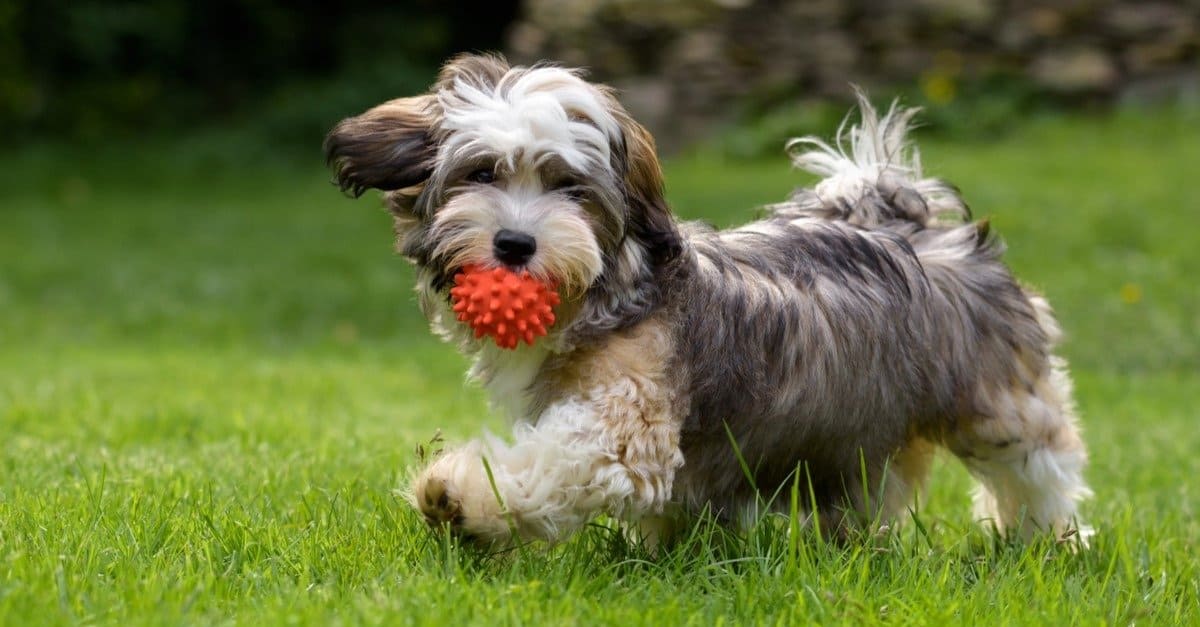
A Havanese picks up commands quickly. This type of toy dog breed is the only dog breed entirely native to Cuba.
©Dorottya Mathe/Shutterstock.com
Havanese dogs are highly active and energetic. They love to learn new tricks and play games with their owners. They are also very social and love being around people, which is perfect for their social nature. If you want a happy Havanese pup, make sure that they get enough socialization in their day, or they may become substantially shy and timid when around others.
These dogs can make good watchdogs as they alert their owners of strangers, but their small size puts them at a disadvantage as a guard dog (as much as they might like to think differently). They are generally good to other pets in the house, though they may bark excessively without additional training.
Havanese are considered to be a great breed for city living.
How to Take Care of a Havanese
The breeding and small build of the Havanese dog require specialized attention. While they are hardly difficult dogs to care for, there are a few things that you should know to take good care of a Havanese dog:
The Best Dog Food for Havanese Dogs
Havanese dogs should be fed a total of one-half to one full cup of dry dog food in a day, which should be broken down into two meals a day. Without a restricted diet for this pup, they can become overweight. While a few pounds may not be much of a big deal on a large dog (like a Labrador or a German Shepherd), this tiny dog cannot handle too much extra fat on its body.
Do not feed human food to your Havanese dog, as it can cause some serious health problems for them. If prepared without oils or seasoning, you can mix turkey, chicken, and beef into their diet as great sources of protein for the pup. Additionally, dogs like the Havanese can be prone to heart conditions and probably shouldn’t eat dog food containing legumes, due to the link between legumes and heart failure in dogs. Compare some legume-free dog foods.
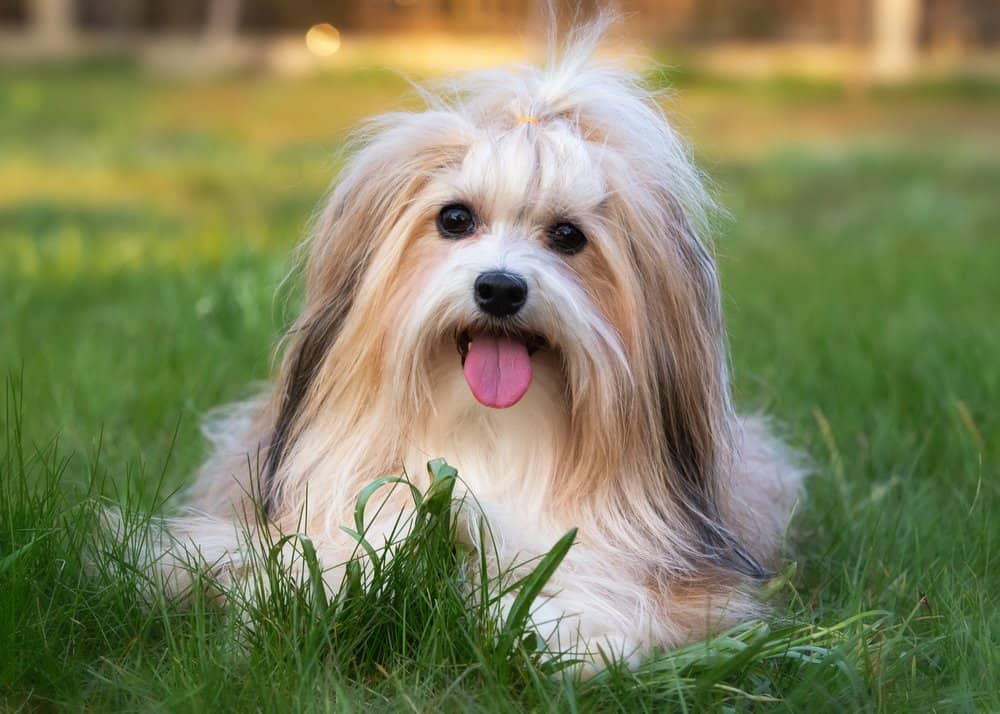
Keep your Havanese dog’s diet legume free!
©Sandra Huber/Shutterstock.com
A-Z Animals believes Wellness CORE RawRev Wholesome Grains Small Breed Original Recipe is the best dog food for Havanese Dogs.
That’s because, without any legumes such as lentils or peas, this formula adds natural chondroitin sulfate and glucosamine to your Havanese’s diet through real turkey and chicken. There’s lots of calcium to build healthy joints, bones, and cartilage. And the taurine is a plus to help keep your dog’s heart in tip-top shape.
You can find Wellness CORE RawRev Wholesome Grains Small Breed Recipe on Chewy or Amazon.
- Nutrient packed kibble plus100% raw freeze-dried turkey pieces
- Contains glucosamine for strong joints, probiotics for digestive health, omega fatty acids for healthy skin and coat, and taurine for a healthy heart
- No legumes, potatoes, fillers, or artificial flavors
Maintenance and Grooming
Havanese dogs require regular grooming sessions. Brush the coat of your Havanese pet dog at least two to three times a week, removing any tangles that could eventually result in matting. Though the price can be high, professional grooming is often the most effective.
They would need a bath every 1-2 weeks, but the frequency depends on the thickness of the coat and how dirty they may become.
Never brush its coat when it is dry. If you brush the coat when they have not recently had a bath, spray water or waterless shampoo on the coat before brushing.
Types of Havanese
The Havanese goes by three different names – Havana Silk Dog, Cuban Bichon, and the Bichon Havanais – and comes in a rainbow of 16 different colors. The most common colors are:
- Cream
- Gold
- Fawn
- Red
- Chocolate
- Silver
- Blue
- Brindle
- Sable
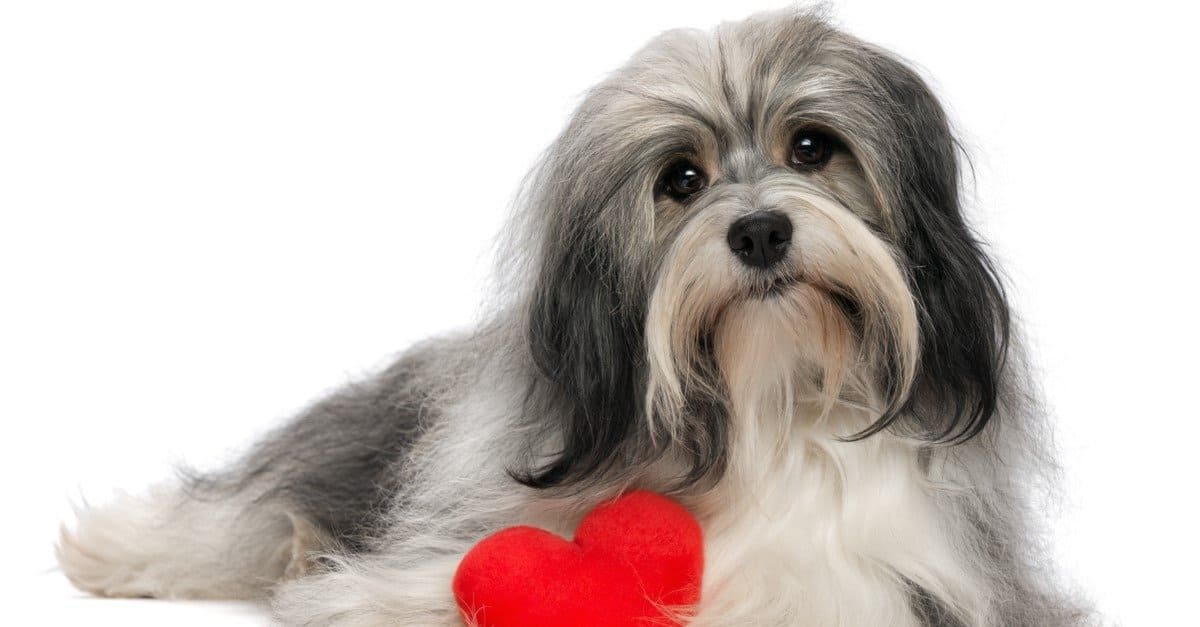
Havanese all have different patterns and markings.
©Dorottya Mathe/Shutterstock.com
Training
Havanese dogs are easy to train. They are intelligent and clever, allowing them to quickly learn to pick up commands. They are also capable of learning new tricks and even coming up with games to play with their owners.
Exercise
Havanese dogs are exceedingly small in size and do not require a lot of exercise to stay healthy or even to burn off energy. On average, they would only need about 30 minutes of exercise daily. Usually, they would just want to stay curled up next to the owner’s resting place, comfortably and lovingly curled up with their human companion.
Puppies
Much like the adults, Havanese puppies are also not difficult to train and can easily pick up habits from a young age. Puppies of this breed are often only 2.5-4 lbs. at 8 weeks old, so they will need their meals split into more meals throughout the day to get all of the nutrition they need to grow.
Most Havanese puppies reach their adult size by the time they are 8 months old, though they don’t reach adult maturation until they are a year old.
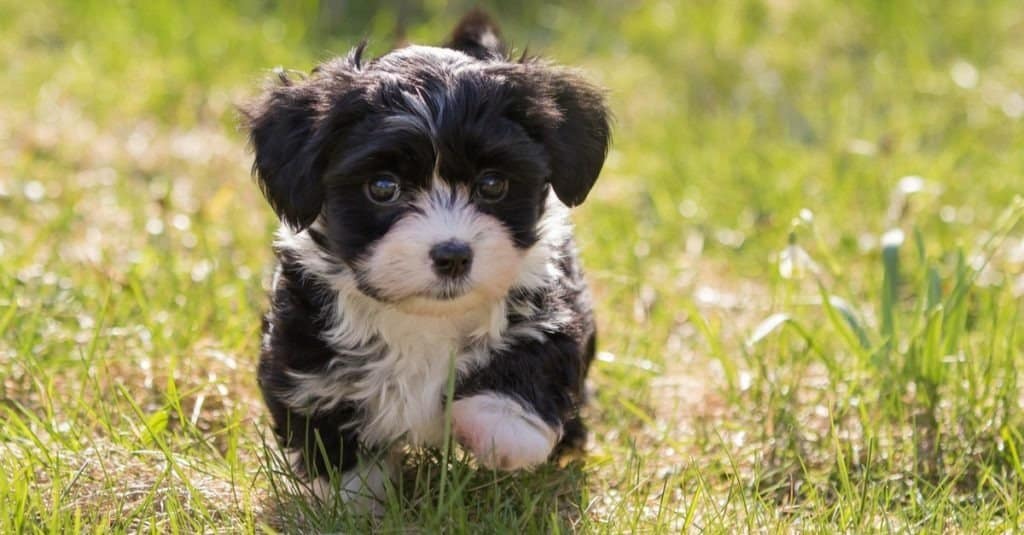
©Sandra Huber/Shutterstock.com
Havanese and Children
Havanese dogs are very loving and affectionate and are great with children. They are known to make great play companions and watchdogs for children. Since they are not bulky, the only risk that smaller children may have is in the possibility of being nipped. However, since the puppies and adults are easy to train, any aggressive behaviors are easy to eliminate.
Dogs Similar to the Havanese
If a Havanese pup is not the right match for your family dynamic (or your budget!), many other breeds could still work well for you. Here are a few dogs that are similar to the Havanese dogs.
- Maltese: Much like the Havanese dogs, Maltese are also hypoallergenic. However, they are not friendly with overly hyper children, so this dog is a better match for a household with only adults.
- Bichon Frise: These dogs are also happy-go-lucky much like Havanese dogs. They are close to Havanese dogs in terms of size – they are usually 9.5 to 11.5 inches while Havanese dogs are about 8 to 11 inches. They are fun to groom, though they may need professional groomers to handle their fluffy fur.
- Bolognese: The Bolognese dogs are hypoallergenic. They are also calm and loyal, though they may not enjoy being around more excitable families, as easy-going as they may be.
Famous Havanese
Havanese dogs are owned by a lot of famous personalities. Some of them include Venus Williams, Donald Trump Jr., Robert Verdi, Barbara Walters, and Heidi Klum.
This breed is also no stranger to the film industry. However, the AKC only officially recognized this dog’s breed in 1996, so it is possible that the breed has not been officially credited in their roles before that year.
Popular Names for Havanese
Here are some popular names for your Havanese pet dog:
- Alex
- Carlos
- Arlo
- Jorge
- Martin
Havanese FAQs (Frequently Asked Questions)
Are Havanese herbivores, carnivores, or omnivores?
Havanese are Omnivores, meaning they eat both plants and other animals.
What Kingdom do Havanese belong to?
Havanese belong to the Kingdom Animalia.
What class do Havanese belong to?
Havanese belong to the class Mammalia.
What phylum to Havanese belong to?
Havanese belong to the phylum Chordata.
What family do Havanese belong to?
Havanese belong to the family Canidae.
What order do Havanese belong to?
Havanese belong to the order Carnivora.
What type of covering do Havanese have?
Havanese are covered in Hair.
What genus do Havanese belong to?
Havanese belong to the genus Canis.
How much does a Havanese cost to own?
The price of Havanese dogs is usually about $800 to $1,200. Expect to spend an additional $1,000 each year, leaving allow room for maintenance, grooming, and other needs.
Is the Havanese good with kids?
Yes, the Havanese dogs are great with children and make great playmates and watchdogs.
How long does a Havanese live?
These dogs usually live for about 13 to 15 years.
Are Havanese hypoallergenic?
Yes, Havanese dogs are hypoallergenic.
Do Havanese shed?
No, Havanese dogs do not usually shed.
How big do Havanese get?
They are about eight to eleven inches in size. Havanese Poodle mix dogs are usually eight to fifteen inches in size.
Are Havanese yappy?
Havanese dogs are not very yappy but they might sometimes bark at strangers. If they are not trained properly, the barking could excessively increase.
What is an interesting fact about Havanese?
Havanese are the only dogs that are native to Cuba.
What is the scientific name for the Havanese?
The scientific name for the Havanese is Canis lupus.
What's the difference between the Havanese and the Coton De Tulear?
The Coton De Tulear comes in fewer colors compared to the Havanese. Additionally, the Havanese was originally bred for companionship, while the Coton De Tulear was originally bred for hunting rodents.
What's the difference between the Havanese and the Shih Tzu?
The Shih Tzu weighs more than the Havanese on average. Both of these dogs have long and beautiful coats, but the Shih Tzu is used more in showmanship compared to the Havanese. Finally, the Havanese originated in Cuba, while the Shih Tzu originated in China.
What's the difference between the Havapoo and the Havanese?
The Havanese is a purebred dog while the Havapoo is a crossbreed of dog. Additionally, the Havanese originated in the 1500s, while the Havapoo is a recent dog breed- less than 30 years old!
Thank you for reading! Have some feedback for us? Contact the AZ Animals editorial team.
Sources
- Wikipedia, Available here: https://en.wikipedia.org/wiki/Havanese_dog
- Havsluv Havanese, Available here: https://www.havsluv.com/history
- American Kennel Club, Available here: https://www.akc.org/dog-breeds/havanese/
- Gateway Havanese, Available here: https://gatewayhavanese.com/havanese-dogs/average-price-havanese-puppy/
- Dogtime, Available here: https://dogtime.com/dog-breeds/havanese#/slide/1
- Hillspet, Available here: https://www.hillspet.com/dog-care/dog-breeds/havanese
- HCA Horizons, Available here: chrome-extension://ohfgljdgelakfkefopgklcohadegdpjf/http://www.havanese.org/files/HCAHorizonsVol4Issue4.pdf
- Dog Breeds Expert, Available here: https://www.dog-breeds-expert.com/havanese.html#:~:text=According%20to%20the%20AKC%2C%20the,Black%20and%20Tan
- Puppies Club, Available here: https://puppiesclub.com/havanese-dog-colors/
- Havanese , Available here: https://www.havanese.org/about/history

